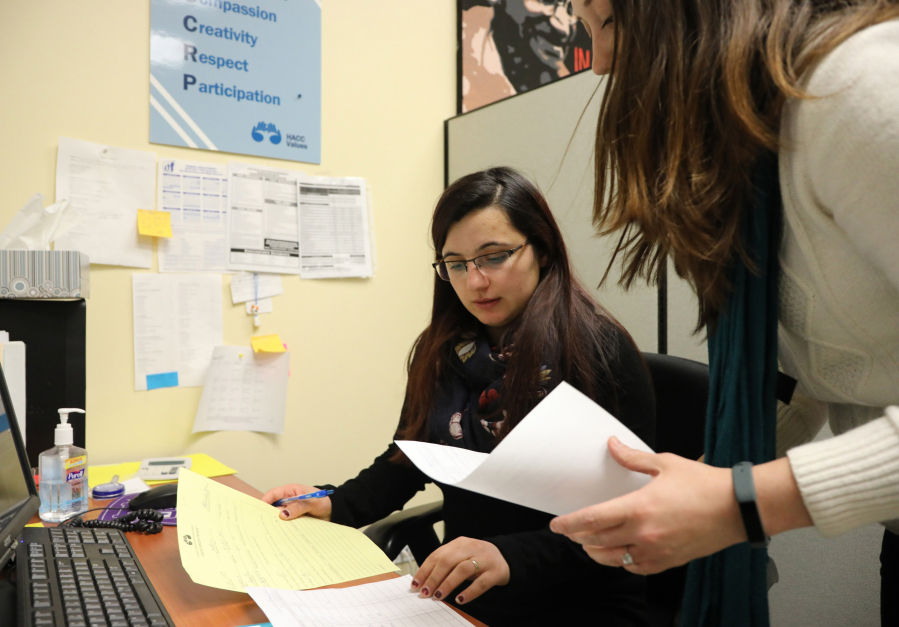CHICAGO — The first time he applied for a medical residency in the U.S., Rafel AlHiali felt buoyant.
With nine years of experience as a physician, the Iraq native and recent immigrant to Chicago felt confident he’d be treating patients again soon.
He sent off the applications and waited. And waited. “First week, first month, second month. There was nothing,” AlHiali said. “I was really shocked.”
Five years later, after several failed attempts to land a residency, AlHiali, 40, works part-time as a medical interpreter while he tries to reclaim his derailed career.
Highly skilled immigrants such as AlHiali often encounter a labyrinth of obstacles when they try to find jobs in the U.S., frustrating not only their ambitions but also their earning potential as they settle for lower-skill positions.
President Donald Trump’s support for merit-based immigration systems, such as those used in Canada and Australia, could make it easier for immigrants with advanced educations and skill sets to enter the U.S. Trump praised those systems for adhering to “a basic principle that those seeking to enter a country ought to be able to support themselves financially.”
But those already here say the expertise they brought with them to the U.S. often goes to waste. Lengthy recertification processes, language barriers and employers’ unfamiliarity with foreign credentials hobble immigrants’ efforts to find work in their fields. They take jobs as janitors, babysitters and valets to get by.
The Migration Policy Institute, a nonpartisan research organization, calls it brain waste. Nearly 2 million college-educated immigrants and refugees in the U.S. are unemployed or working in low-skill jobs despite years of education and work experience.
Meanwhile, a growing share of immigrants are highly educated. Almost half of adults who entered the U.S. between 2011 and 2015 were college graduates, up from a third who came from 2007 to 2009, according to the institute.
The Trump administration has not made any policy announcements about what a merit-based immigration system might entail. A White House spokesman said only that the president has tweeted about the concept generally.
The current U.S. immigration system prioritizes family unification. Nearly two-thirds of the 1 million legal permanent residents accepted into the country in 2015 were either immediate relatives of American citizens or sponsored by family, while 14 percent were employment-based admissions, according to the Department of Homeland Security. Fifteen percent were refugees or asylum seekers, and 5 percent came through a diversity lottery for people from countries with low immigration rates to the U.S.
Some experts have reservations about a merit-based system.
One concern is that focusing on highly skilled immigrants ignores the demand for lower-skilled labor, such as in agriculture, where employers say they struggle to draw a workforce. Yet even for highly skilled immigrants, the system might not be as promising as it sounds.
Canada pioneered the merit-based concept in the 1960s, but even there, more than 40 percent of highly educated immigrants are overqualified for the jobs in which they work, said Jeanne Batalova, a senior policy analyst at Migration Policy Institute.
In Canada, applicants receive points for education, occupation, the ability to speak one or both of the country’s official languages, an existing job offer and graduation from a Canadian university.
Part of the mismatch — in Canada as well as in the U.S. — has to do with the strength of the local labor market, but it also reflects a need for community organizations to help both immigrants and employers navigate unfamiliar territory, Batalova said.
“Employers are frankly lost in terms of how to evaluate credentials, legal status, languages,” she said.
Some advocates for stricter immigration applaud Trump’s support of a merit-based system. Highly skilled immigrants wouldn’t compete with U.S. workers for low-skill jobs, and they could have a positive impact if they pay more taxes and use fewer services, said Steven Camarota, research director at the Center for Immigration Studies, a nonprofit group that favors reducing immigration.
Still, wages haven’t increased for many jobs employers say they have trouble filling, and many educated Americans have trouble finding work in their fields, he said.
Even if Trump emphasizes an immigration system based on skills and education, officials will need to address how easily that experience can be put to use.
Facing licensing tests that require hundreds of dollars, or having to repeat an entire course of study, many immigrants with advanced skills take lower-paying “survival jobs” to pay rent and buy groceries.
The situation is not only demoralizing for immigrants but robs communities of scarce skills, Batalova said. Ethnic communities are in particular need of professionals who can speak the language and understand cultural nuances in key fields like health care.




